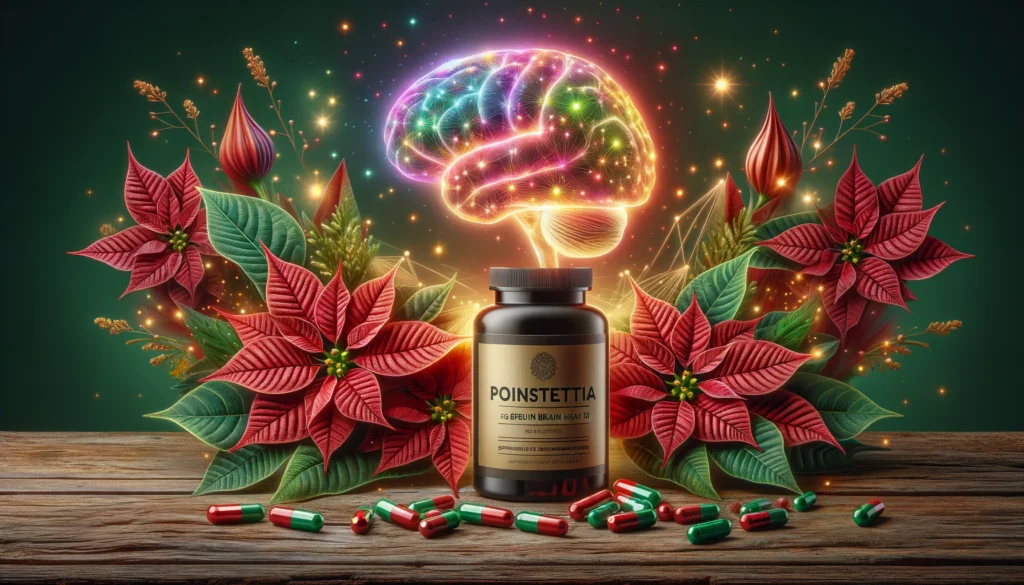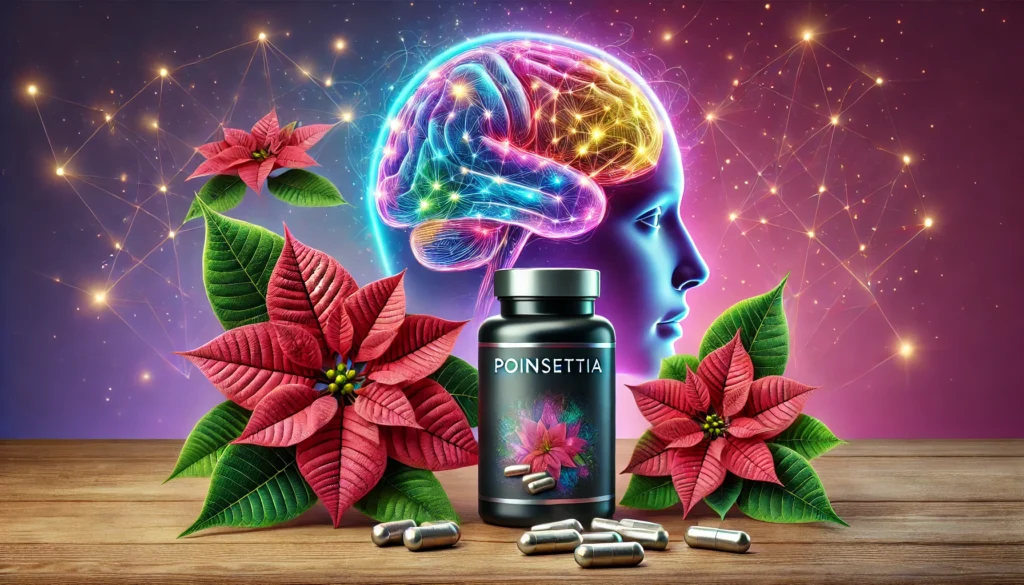Poinsettia (Euphorbia pulcherrima), a vibrant plant often associated with holiday decor, is gaining attention for its potential nootropic benefits. Traditionally, Poinsettia has been utilized in folk medicine, with various parts of the plant used to address inflammation, respiratory issues, and even skin conditions. This article explores the nootropic potential of Poinsettia, detailing its chemistry, physiological mechanisms, dosage, side effects, interactions, and other essential considerations for safe supplementation.
You May Also Like:
Poinsettia: Potential Nootropic Benefits, Dosage, Side Effects, Interactions, and Other Important Information About This Supplement is an original (NootropicsPlanet) article.
Sources of Poinsettia
Poinsettia is native to Central America, particularly Mexico, where it was historically revered by the Aztecs for both its medicinal and aesthetic properties. The plant is distinguished by its vibrant red bracts, though it can also be found in shades of pink, white, and variegated patterns. While commonly grown as an ornamental, Poinsettia has a documented history of medicinal use due to its bioactive compounds.
Extracts are typically derived from Poinsettia’s leaves and bracts, where various phytochemicals are concentrated. However, in commercial settings, specific extracts are created to avoid toxic compounds found in the plant’s latex. The availability of Poinsettia extracts as supplements is limited, but growing interest in its nootropic potential suggests possible future formulations tailored for cognitive health.
Unlock Brain Health and Mental Resilience with Advanced Bacopa Monnieri—Shop Now on Amazon!

Chemistry of Poinsettia
The bioactivity of Poinsettia is attributed to several unique phytochemical groups. Key components include terpenoids, flavonoids, and phenolic acids, which are believed to influence both inflammatory and neuroprotective pathways. Research has also identified certain alkaloids and triterpenoids that may possess analgesic, anti-inflammatory, and neuroprotective properties.
- Terpenoids: These compounds, including euphol, have been shown to possess anti-inflammatory and antioxidant properties, potentially protecting against cellular damage in the brain. Euphol specifically exhibits anti-inflammatory effects through inhibition of pro-inflammatory cytokines, which may have neuroprotective effects.
- Flavonoids and Phenolic Acids: Poinsettia contains quercetin and kaempferol, which are known antioxidants. These compounds mitigate oxidative stress and protect neurons from damage caused by reactive oxygen species (ROS), a mechanism linked to cognitive aging and neurodegenerative conditions.
- Alkaloids and Triterpenoids: Alkaloids in Poinsettia have mild effects on the central nervous system, potentially contributing to mood stabilization and cognitive support. Triterpenoids, such as those found in Poinsettia, are known for their anti-inflammatory and analgesic properties, which may be valuable in managing neuroinflammation.
Physiological Mechanisms of Poinsettia in the Body and Brain
Poinsettia’s potential as a nootropic lies in its capacity to support anti-inflammatory, antioxidant, and neuroprotective pathways. Each of these mechanisms plays a vital role in brain health and cognitive performance:
- Anti-inflammatory Action: Chronic neuroinflammation is associated with cognitive decline and neurodegenerative diseases. The terpenoids in Poinsettia, particularly euphol, inhibit inflammation by downregulating pro-inflammatory cytokines. By reducing inflammation, Poinsettia may offer neuroprotective benefits, making it a potential aid for cognitive health.
- Antioxidant Defense: Flavonoids such as quercetin and kaempferol reduce oxidative stress by scavenging free radicals. This activity is essential for brain health, as the brain is highly susceptible to oxidative damage due to its high oxygen consumption. Through this antioxidant activity, Poinsettia may help protect neurons and improve cognitive resilience over time.
- Mood and Cognitive Support: Some studies suggest that certain alkaloids and triterpenoids may influence neurotransmitter activity, contributing to mood regulation. While direct evidence of Poinsettia’s impact on mood is limited, the bioactive compounds may enhance cognitive performance by stabilizing mood and reducing the mental fatigue associated with chronic inflammation and oxidative stress.

Nootropic Benefits of Poinsettia
The potential nootropic benefits of Poinsettia are under investigation, with preliminary evidence suggesting the following advantages:
- Cognitive Resilience Against Aging: The combined antioxidant and anti-inflammatory effects of Poinsettia compounds may help prevent age-related cognitive decline. By protecting neurons from oxidative stress and inflammation, Poinsettia could contribute to long-term cognitive health. These protective properties may reduce the risk of neurodegenerative diseases such as Alzheimer’s and Parkinson’s, which are often linked to oxidative damage and inflammation. Additionally, regular supplementation could bolster cognitive function in aging individuals, helping maintain mental agility and memory.
- Mood Stabilization and Mental Clarity: The plant’s alkaloids may influence neurotransmitter pathways related to mood and stress resilience, potentially improving mental clarity and reducing cognitive fatigue. By supporting mood balance, Poinsettia could be beneficial for individuals facing chronic stress or anxiety, both of which can impair focus and decision-making. The stabilizing effect on neurotransmitters may also help improve sleep quality, further enhancing cognitive performance.
- Enhanced Focus and Memory Retention: While not extensively studied, the neuroprotective effects of Poinsettia may indirectly benefit focus and memory by creating a healthier brain environment. Antioxidants like quercetin support neuronal integrity, which is vital for maintaining focus and memory over time. By enhancing synaptic plasticity and protecting against neuron degeneration, Poinsettia may contribute to improved information retention and recall, particularly valuable in learning and high-stress environments.
- Protection Against Neurotoxins: Certain bioactive compounds in Poinsettia may protect neurons from damage caused by environmental neurotoxins, such as heavy metals or industrial pollutants. These neuroprotective effects could be valuable for individuals in high-risk professions or areas with increased exposure to these toxins. Additionally, this protective action may aid in reducing the cognitive decline associated with prolonged toxin exposure, offering a defensive advantage for long-term brain health.
- Improved Mental Stamina: Poinsettia’s flavonoids and terpenoids may support sustained mental energy, reducing the onset of mental fatigue. This benefit is particularly useful for tasks requiring prolonged concentration, such as studying or working in cognitively demanding roles. By promoting efficient cellular energy production and reducing oxidative stress, Poinsettia may help users feel more mentally alert and capable of handling extended periods of focus.
- Support for Brain-Body Connection: Some phytochemicals in Poinsettia may contribute to improved communication between the brain and the body’s physiological systems, such as the nervous and endocrine systems. This can help regulate the body’s response to stress, potentially improving physical coordination and stress recovery. Through enhanced connectivity, Poinsettia could assist in optimizing both cognitive and physical performance, offering a balanced approach to mental and physical well-being.

Dosage and Supplementation Guidelines
Since Poinsettia is traditionally used as an herbal remedy rather than a standardized supplement, dosing guidelines for nootropic purposes are still being established. For those interested in using Poinsettia extracts, it’s crucial to proceed with caution, particularly given the plant’s potential toxicity in raw form.
- Standardized Extracts: Supplementation with Poinsettia should ideally be done with standardized extracts that have been processed to remove toxic latex components. A dosage of 100–200 mg per day of a concentrated extract may offer a starting point, though more research is necessary to establish safe and effective doses for cognitive enhancement.
- Tolerance and Sensitivity: Individuals with known sensitivities to plants in the Euphorbia family should avoid Poinsettia. Gradual introduction and consultation with a healthcare provider can help mitigate risks associated with high doses or unknown sensitivities.
Side Effects and Safety
While Poinsettia is generally regarded as safe in low, controlled doses, certain side effects are worth noting, especially given the plant’s reputation for mild toxicity in its raw form. Side effects may include:
- Digestive Disturbances: Gastrointestinal upset, including nausea and diarrhea, can occur, particularly if the extract is not adequately processed to remove irritant compounds.
- Allergic Reactions: Contact with Poinsettia latex can cause skin irritation, especially in individuals with sensitivities to the Euphorbia family. Even when taken orally, allergic reactions, though rare, may include rashes, itching, or respiratory symptoms.
- Neurotoxicity Risks: Excessive doses of unprocessed Poinsettia latex can result in neurotoxic effects, underscoring the importance of using purified, standardized extracts designed for supplementation.
Fuel your mind and elevate memory retention with Rutin—Take the first step, Buy Today!

Interactions with Other Supplements and Medications
Poinsettia’s potential interactions with other medications and supplements remain relatively uncharted, but certain interactions are plausible based on its bioactive compounds:
- Anti-Inflammatory Medications: Given Poinsettia’s anti-inflammatory properties, combining it with NSAIDs or corticosteroids could amplify anti-inflammatory effects, potentially leading to adverse outcomes. Individuals taking prescription anti-inflammatory drugs should consult a healthcare provider before using Poinsettia.
- Antioxidant Supplements: When used alongside antioxidant supplements (e.g., vitamin C, vitamin E), Poinsettia may have a synergistic effect, which can be beneficial but also carries the risk of excessive antioxidant activity. High antioxidant levels can potentially interfere with cellular redox balance, leading to cellular damage.
- Sedatives and Antidepressants: Poinsettia’s mild effects on the central nervous system may interact with sedatives or certain antidepressants. This interaction could result in compounded sedative effects or impact neurotransmitter activity, making it essential to seek medical advice when combining Poinsettia with psychotropic medications.
- Blood Pressure Medications: While not extensively studied, some Poinsettia compounds might influence vascular health. Individuals on blood pressure medications should be cautious and consult their healthcare provider to avoid potential interactions.
Risks for Individuals with Certain Health Conditions
Due to its bioactive nature, Poinsettia may pose risks for individuals with certain pre-existing conditions:
- Liver and Kidney Conditions: Poinsettia metabolites are processed by the liver and kidneys, meaning individuals with hepatic or renal impairment should avoid supplementation to prevent undue strain on these organs.
- Autoimmune Diseases: As an anti-inflammatory, Poinsettia may interfere with the immune-modulating effects of medications prescribed for autoimmune conditions. Medical supervision is essential for individuals with autoimmune diseases considering Poinsettia supplementation.
- Pregnancy and Lactation: The effects of Poinsettia during pregnancy and lactation have not been studied extensively. Given its mild toxicity in raw form, it is recommended that pregnant or nursing individuals avoid Poinsettia supplementation unless advised by a healthcare professional.
Conclusion: Should You Consider Poinsettia as a Nootropic?
The potential nootropic benefits of Poinsettia, while intriguing, require further research to fully substantiate its efficacy and safety for cognitive enhancement. Poinsettia’s anti-inflammatory and antioxidant properties offer promising neuroprotective effects, which could support cognitive resilience against aging and stress. However, due to potential toxicity and limited data on safe dosing, anyone considering Poinsettia as a nootropic should seek standardized, purified extracts and consult with a healthcare professional.
In summary, Poinsettia holds potential as a supplementary nootropic, offering benefits for brain health, particularly through its antioxidant and anti-inflammatory effects. By exercising caution with dosing and remaining aware of possible interactions and side effects, individuals may find Poinsettia a valuable addition to their cognitive health regimen.

References:
- Poinsettia – Uses, Side Effects, and More. Retrieved from: https://www.webmd.com/vitamins/ai/ingredientmono-470/poinsettia
- Oxidative Stress in Alzheimer’s and Parkinson’s Diseases: Insights from the Yeast Saccharomyces cerevisiae. Retrieved from: https://pmc.ncbi.nlm.nih.gov/articles/PMC3371773/
- Unique and interactive effect of anxiety and depressive symptoms on cognitive and brain function in young and older adults. Retrieved from: https://pmc.ncbi.nlm.nih.gov/articles/PMC4222514/
- Oxidative Stress and Cognitive Decline: The Neuroprotective Role of Natural Antioxidants. Retrieved from: https://pmc.ncbi.nlm.nih.gov/articles/PMC8548611/
Important Note: The information contained in this article is for general informational purposes only, and should not be construed as health or medical advice, nor is it intended to diagnose, prevent, treat, or cure any disease or health condition. Before embarking on any diet, fitness regimen, or program of nutritional supplementation, it is advisable to consult your healthcare professional in order to determine its safety and probable efficacy in terms of your individual state of health.
Regarding Nutritional Supplements Or Other Non-Prescription Health Products: If any nutritional supplements or other non-prescription health products are mentioned in the foregoing article, any claims or statements made about them have not been evaluated by the U.S. Food and Drug Administration, and such nutritional supplements or other health products are not intended to diagnose, treat, cure, or prevent any disease.


